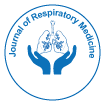Helping the Hard-Core Smokers Suffering from Pulmonary Infection
Editor assigned: 01-Jan-1970 / Reviewed: 01-Jan-1970 / Revised: 01-Jan-1970 /
One on two smokers who smokes all his lifetime will die from a disease related to tobacco use. Every year, tobacco smoking is responsible for about 6 million deaths worldwide; it could kill 1 billion people during the 21st century. Most of the smokers have in common to be highly dependent on nicotine, a sLJnLficDnt level of cigarette consumption and great dL ٹcuOt\ to quit smoking; these hardcore smokers, strongly inhaling tobacco smoke and quite oіen users of others psychoactive substances (cannabis, cocaine) are particularly vulnerable to respiratory diseases related to this exposure . Нe leading cause of lung cancer worldwide in both males and females is tobacco smoking. It has been shown that smoking has a detrimental e ٴو ect on survival, it increases the risk of post-operative complications in the case of resection surgery, decreases the e ٹcDc\ and tolerance of medical treatments (chemotherapy and radiotherapy), in smoker the risk of second primary malignant tumor is increased. On the contrary stopping smoking at the time of diagnosis improves cancer prognosis and patients’ quality of life. Smoking is a main cause of chronic obstructive pulmonary disease (COPD). A recent review of the literature has highlighted that there is a high prevalence of tobacco smoking among patients su ٴو erLnJ from COPD. Smoking cessation reduces all at once decline of lung function, frequency of exacerbations and improves response to bronchodilators and inhaled corticosteroids. Smoking has a negative impact on many respiratory diseases and infections. Нe pathophysiological mechanisms by which tobacco smoke is a cause of asthma is poorly understood; however smoking cessation is a component of the management of the disease. Tobacco smoke impairs the lung defense mechanisms against infections. Compared with people who do not smoke, active or passive smokers have approximately two sLJnLficDnt risk of having active TB in the case of infection; TB smokers have an increased risk of death, these findLnJs lead to recommend the systematic management of smoking cessation in TB smokers.
A study highlighted, in a setting of care well organized including antiretroviral therapy free of charge, that the number of life-years lost (at 35-year-old) in association with smoking in HIV-infected smokers compared to HIV-infected abstinent of tobacco smoking were 12, 3. Нe pulmonologist holds a prominent place in the diagnosis of respiratory diseases. Lung cancer, COPD, asthma, pulmonary tuberculosis and many other pulmonary diseases are caused or worsened by smoking. At the forefront of healthcare professionals, pulmonologists must be involved in helping patients to stop smoking. Smoking cessation interventions are not complicated nor timeconsuming; all increase abstinence rates : simple advice to stop smoking, minimal intervention in 5 steps (the 5 As: ask, advise, assess, assist, arrange), behavioral and cognitive strategies to reinforce motivation to quit smoking and ability to control craving, medication treatments for nicotine dependence (nicotine replacement therapies, varenicline or bupropion) in dependent smokers decrease withdrawal syndrome and craving. Нe inventory of respiratory diseases of whose smoking is the main cause, risk or aggravating factor, as well as gains in abandoning tobacco smoking highlights the need for the pulmonologists to be involved in smoking cessation.
Share This Article
Recommended Journals
Open Access Journals
Article Usage
- Total views: 897
- [From(publication date): 0-2021 - Jan 31, 2025]
- Breakdown by view type
- HTML page views: 368
- PDF downloads: 529
